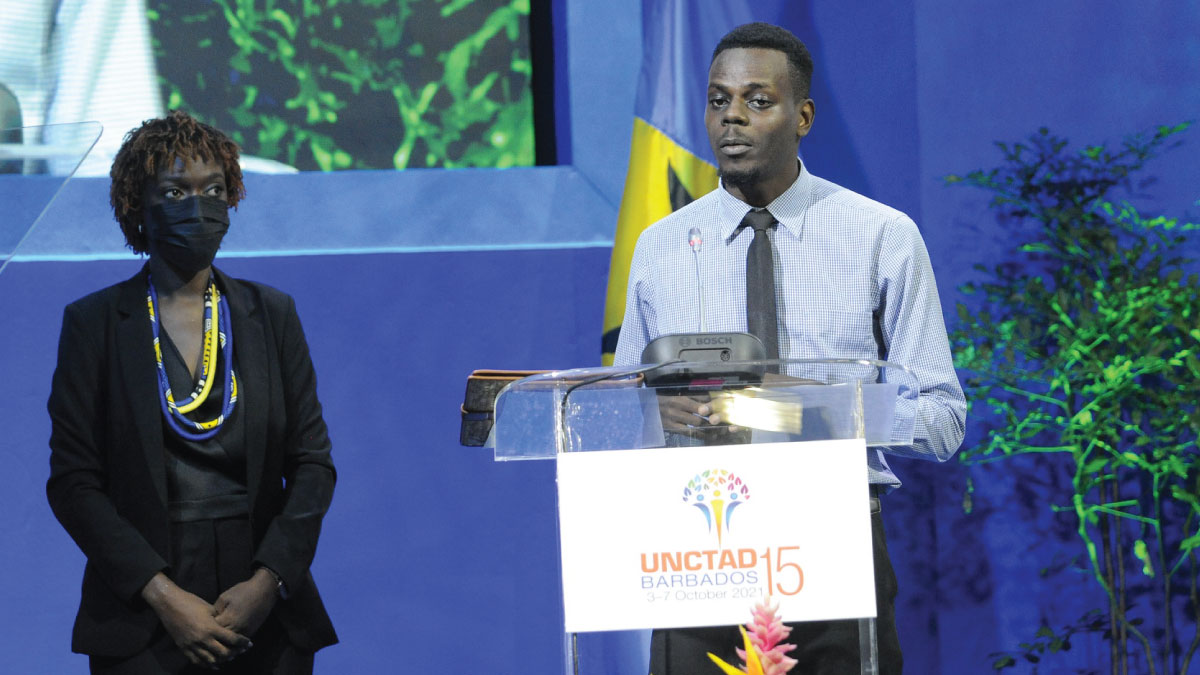The declaration will serve as a springboard for youth diplomacy to grow into a legitimate force and shape the trade and development agenda in the coming years.

Barbados UNCTAD15 Youth Forum lead Roshanna Trim (left) and LeAundre Knight from the country's UNCTAD youth network present the declaration to conference delegates. © Barbados Government Information Service
More than 300 young participants from over 70 countries bound by a shared vision to deliver prosperity for all adopted a declaration that calls for inclusivity and resilience in global efforts to recover from the COVID-19 crisis.
The Youth Declaration presented at UNCTAD’s 15th quadrennial conference was a culmination of monthlong consultations among young leaders from across the world. It sets out the priorities and recommendations of youth who participated in the UNCTAD15 Youth Forum held in the lead-up to the conference.
The youth selected five topics they deemed to be the most crucial to young people to address now: inclusive social and economic development, new economies, climate action, inclusive and equitable learning and youth civic participation.
The declaration notes that although the COVID-19 pandemic has created a sea of challenges, a forward-looking picture points towards advancing a “trinity of sustainomics”, encompassing policies consolidating “skill development, strengthening the business environment (including capital markets) and reintegrating equitable solutions for cross-cutting aspects within a green transition.”
Collective aspiration
“The youth declaration reflects the collective aspiration of young people striving to build a better world. At the same time, it offers world leaders and public institutions a roadmap on how to better prepare the youth for the future that is digital, and meaningfully include them in decision-making processes,” said Thomson Ch’Ng from Malaysia.
The youth emphasized the need to stem ongoing environmental degradation, which has gained global attention due to increased youth advocacy. “We have documented inclusive solutions to mitigate climate change, which range from acknowledging the role of indigenous groups in averting climate crises to revitalizing the blue and green economies,” said Parneet Kaur from India.
Access to quality education also featured prominently. “COVID-19 has disrupted a lot of major sectors, but no sector has seen as much disruption as education, where inequity across social classes has never been so profound,” said Muhammad Sarim Raza from Pakistan.
To seize the benefits of the rapidly unfolding technological transformation, he called for the comprehensive restructuring of existing educational systems. “Students should get equipped with the right skill set in demand on the labour market at this moment,” he added.
Several participants said the declaration is a testimony to the reality that if the youth start thinking in terms of solutions, world leaders will have no choice but to act on them.
Going beyond the UNCTAD15 conference, the declaration will serve as a springboard for youth diplomacy to grow into a legitimate force and shape the trade and development agenda in the coming years.
Manifesting the spirit of multilateralism
After the COVID-19 crisis delayed the conference for a year, the participants used the virtual Youth Forum platform to discuss global disparities exacerbated by the pandemic, such as deepened socioeconomic inequalities, a growing digital divide, rising unemployment and looming climate catastrophe.
The forum offered the youth a safe space to exchange personal experiences of disrupted lives due to the pandemic, enabling hundreds of participants to unite in search of concrete solutions.
“Rarely do we have an opportunity to work closely together on a document with other young game changers from across the world, gathered at one place virtually to share our common pathways,” said Aishwarya Gupta from India.
Building on the 2016 Youth Declaration, the youth dived into forward-looking focus areas such as the gig economy, e-commerce and creative industries, which offer the potential for greater youth engagement in the digital era. They raised concern over the high levels of unemployment among the youth, especially in developing countries.
“We went beyond bonding at a professional level to tapping into our personal trials and tribulations, which ignited in each one of us the passion to act,” Ms. Kaur said.
A maturing youth diplomacy
Increasing youth civic participation at community and state levels also emerged as a top priority.
“The Youth Action Hub initiative is one of those unique platforms that promote meaningful youth engagement at the grassroot level, where the youth can work with and hold relevant actors to account,” Mr. Ch’Ng said.
His parting shot was: “In the spirit of ‘thinking globally, acting locally’, we hope that young people can take this experience back to their local communities, create positive impacts and shape the world we all aspire to live in.”


